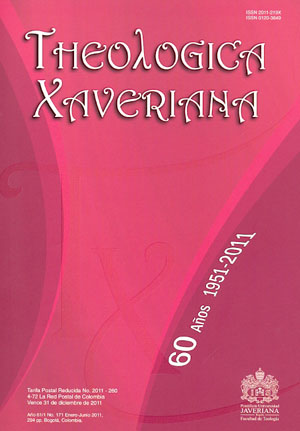Abstract
Based on the contributions from researchers on different disciplines (sociologists, anthropologists, historians, philosophers, and theologians), the author identifies three lines of interpretation: modernization line, fair social change line, and cultural line. He follows the guidelines from the methodical proposal of the Canadian philosopher and theologian Bernard Lonergan in order to formulate a critical, wide, and deep dialogue with the diverse interpretations and theories regarding the popular Latin American Catholic religion in the period from 1960 to 1980.
This journal is registered under a Creative Commons Attribution 4.0 International Public License. Thus, this work may be reproduced, distributed, and publicly shared in digital format, as long as the names of the authors and Pontificia Universidad Javeriana are acknowledged. Others are allowed to quote, adapt, transform, auto-archive, republish, and create based on this material, for any purpose (even commercial ones), provided the authorship is duly acknowledged, a link to the original work is provided, and it is specified if changes have been made. Pontificia Universidad Javeriana does not hold the rights of published works and the authors are solely responsible for the contents of their works; they keep the moral, intellectual, privacy, and publicity rights.
Approving the intervention of the work (review, copy-editing, translation, layout) and the following outreach, are granted through an use license and not through an assignment of rights. This means the journal and Pontificia Universidad Javeriana cannot be held responsible for any ethical malpractice by the authors. As a consequence of the protection granted by the use license, the journal is not required to publish recantations or modify information already published, unless the errata stems from the editorial management process. Publishing contents in this journal does not generate royalties for contributors.


